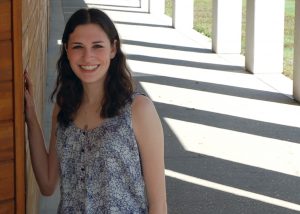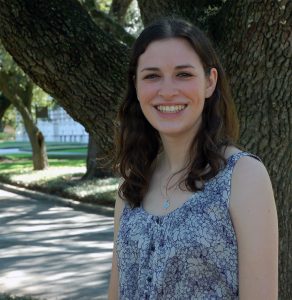 CS Senior Rachel Resnick is moving to Silicon Valley to work as a software engineer for Apple after she graduates in May, but she almost missed her calling. As she explored different courses for her first semester, she told a Peer Academic Advisor that she was unsure of what she wanted to do, but indicated she liked math. Resnick was considering a computer science course when one of the advisors told her not to take it.
CS Senior Rachel Resnick is moving to Silicon Valley to work as a software engineer for Apple after she graduates in May, but she almost missed her calling. As she explored different courses for her first semester, she told a Peer Academic Advisor that she was unsure of what she wanted to do, but indicated she liked math. Resnick was considering a computer science course when one of the advisors told her not to take it.
“She told me she didn’t think I should take COMP 140 because she’d taken it and it was really hard. Here I was –this impressionable freshman, already concerned about Rice’s academic rigor– for an upperclassman to say a class was hard made me believe I wouldn’t be successful there,” said Resnick.
So she signed up for other courses, then got a taste of coding in her second semester in a computational and applied mathematics (CAAM) course. Resnick said, “A lot of what I like about CAAM 210 was the problem solving aspect. Since I had already been introduced to coding, I decided I would take COMP 140 anyway as a sophomore, and I really liked it.” She had also taken a Calculus II class and realized pure math no longer appealed to her.
Rather than indulge in regret for her late start, she became a Peer Academic Advisor. Resnick said, “One of the reasons I became a PAA was to ensure other students got good advice. If I think they should reconsider a class they express interest in, I give them a good reason and allow them to come to their own conclusion. And it’s not because I thought the course was hard.”
The friends she’s made have been an important part of her success in the major, she said. “If I had taken COMP 140 earlier, I would not have met the people who have become some of my closest friends. Iman [Khan] and I started COMP 140 at the same, then we met other CS students through COMP 182 who we’ve worked with since then.”
Their easy camaraderie encouraged their group to continue discussing the CS projects, which Resnick said was typical of the environments she discovered during her internships. She said, “In software engineering, you will not be working on things on your own, you’ll be part of a team. Our professors encourage us – even in individual assignments – to talk about general approaches to the solution together.”
Regardless of the long hours, Resnick realized she was enjoying the assignments. “It takes more time, even to figure out a solution before you can start coding it, but I still enjoy the time I spend on my CS homework more than any other homework,” she said. That kind of satisfaction is something she believes many other people, especially women, could discover if the CS student stereotype were different.
 “Looking back, I’ve been surprised at the number of people who switched into CS as sophomores. You are able to get a BA in CS in three years without doing anything insane, and employers don’t seem to care if you have a BA versus a BS. In my own classes, a fair amount of those who switched sophomore year seemed to be girls. Because of existing gender biases, a lot of girls are not exposed to computer science before college and therefore don’t come in to college wanting to study it.
“Looking back, I’ve been surprised at the number of people who switched into CS as sophomores. You are able to get a BA in CS in three years without doing anything insane, and employers don’t seem to care if you have a BA versus a BS. In my own classes, a fair amount of those who switched sophomore year seemed to be girls. Because of existing gender biases, a lot of girls are not exposed to computer science before college and therefore don’t come in to college wanting to study it.
“Also, people feel that if they wouldn’t enjoy coding in their spare time or taking apart computers, they shouldn’t be a CS major. In the case for me and some of my other friends, it wasn’t until we were around Rice for some time that we realized what computer science actually is about and that you don’t have to dedicate all your free time to it to be successful. Plus, I spend so much time on my class work that I want to do something else with my other time.”
Even though Resnick didn’t work on side projects in her spare time and had taken only one CS course, she still landed a summer internship as a sophomore. She said, “I had finished COMP 140 and just started COMP 182 when I went to the spring Career Expo. I got an internship offer after doing really well in the technical interview, and the person interviewing me was a Rice alum.”
The next summer, she interned at Apple, an experience that led to her post-graduation employment offer. Resnick said, “At first, I thought I wouldn’t be competitive in internship interviews because I didn’t create apps or websites in my spare time, and I generally felt that I was being judged more harshly because I’m a woman. We’re really lucky at Rice, where the gender ratio is way better than the national average for CS majors, that the professors in the department have shown that they want women to be successful.”
Resnick always remembers one event from her first CS class which solidified that, as a woman, she was welcome in CS at Rice. “In one of my classes, the professor came by our table to see how we were approaching the problem. I was giving an answer and a guy was repeating a different answer, but louder and he kept talking over me. Dr. Rixner said, ‘stop talking, I want to hear what she’s saying,’ and mine was the right answer.”
Despite the inclusive atmosphere she has encountered at Rice, Resnick thinks it is important for women in the field to be aware of possible gender discrimination they may face in the industry. Resnick said, “At large tech companies, only about 10-15% of software engineers are women, and at startups, that percentage is even lower. When there are so few of us in an industry that often centers around a ‘brogramming’ culture it can be very hard to feel like you have a voice and that you are being taken seriously. Fortunately, there are a lot of organizations and companies that are dedicated to improving this, but it will take time.’
Reflecting on her CS experience at Rice, Resnick encourages prospective CS students to find a study group. “Talk to the other students in your classes. Get a big group of people to work with,” she said. “As you go through your years of CS classes, you’ll meet more people. Everyone seems willing to collaborate and help each other out. Having that strong network will also be important in the future. Actually, I’ll be living in the Bay Area with two women from my classes and know more Rice CS people who will be out there working after graduation. It’s nice going out there and having a network of people you already know.”
Rachel Resnick completed her B.A. in Computer Science in 2017.